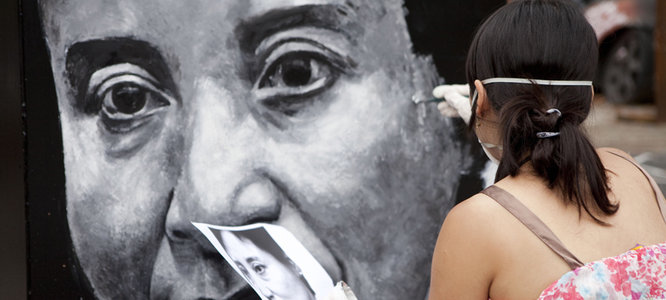The Lady Behind the Fall: Gu Kailai’s Second Trial
The Lady Behind the Fall: Gu Kailai’s Second Trial

The trial of Bo Xilai, the highest Chinese official to fall to scandal in the last thirty years, opened last Thursday, one year and thirteen days after the trial of his wife, Gu Kailai. She was charged with murder, and her trial lasted eight hours and concluded with a conviction and little fanfare (she would receive a suspended death sentence). Bo faces charges of taking bribes, embezzlement, and abuse of power. His trial has lasted five well-publicized days, during which he has accused his wife of being crazy and lying, and implied she had an affair with his security chief, Wang Lijun:
The defendant: Why did Wang Lijun run? The reasons he gives are far-fetched….The real reason he has already made clear—Wang Lijun was secretly in love with Gu Kailai. His emotions were tangled and he couldn’t free himself. This he confessed to Gu Kailai in a letter, even admitting he had slapped himself in the face eight times.
Since Bo was first detained over a year ago, the scandal has played out largely through speculation and censorship on Weibo, China’s version of Twitter. Now, as Bo mounts a fiery defense in court, the story is being told in increments, through Weibo posts issued by the Jinan Intermediate People’s Court in Shandong Province where the trial is being held. As scenes from the trial trickle out (vetted by censors), China-watchers have been wondering: is Bo defending himself in earnest or participating in some deliciously entertaining, but scripted, courtroom theater?
Bo Xilai and the rest of the Communist Party have an excellent scapegoat in Gu Kailai.
If it is part of a script, why would China’s leaders have cast a defiant Bo? For one, it makes the trial look almost real (which it is most likely not—Chinese courts have a conviction rate of 98 percent), and it also distracts from the core of the case against Bo: the level of corruption among China’s top officials. And it is happening at a time when Beijing appears to be cracking down on online commentators and other activists (there have been at least three prominent arrests since the trial started).
While the embezzlement and bribe-taking charges against Bo add up to around $4.4 million, the bribe amounts being mentioned in the trial are relatively small measured on the scales of official corruption, and Bo denies knowledge of any of them: RMB50,000 to fix up Bo’s house (“The Defendant: Tang Xiaolin says he gave me 50,000 yuan because he had heard my house was shabby. Did he really think 50,000 would make a difference?”), money to send Bo’s wife and son on a trip to Africa, and a $12,000 Segway. And, in Bo’s continued denials, he, and the rest of the Communist Party, have an excellent scapegoat in Gu Kailai:
The defendant: She’s a relatively fragile woman….She would be sentenced to death if she were prosecuted for economic crimes as well (as murder). All charges against me are from Gu Kailai.
Gu Kailai is a dragon lady for the ages. Throughout China’s history, women with allegedly huge sexual appetites and a lust for power have been blamed for the fall of empires. Chinese legend holds that Empress Wu Zetian, who ruled form 655–683 BCE, corrupted monks and hired them to perform acts of sorcery. Empress Cixi pushed her son’s favorite concubine down a well. If you believe the court ruling, Gu poured poison down an Englishman’s throat.
Wives of top officials in China are barely visible in the public eye (the popstar wife of Xi Jinping—China’s recently appointed president—is a notable exception), but Gu Kailai was a force from the start of her husband’s career. In the 1990s Gu was the inspiration behind a television drama called “To Win a Lawsuit in America.” She was fashionable where other political wives were demure. And, if rumors and China’s courts are to be believed, after thirty years of calculated political ascension, she completely lost her mind and poisoned a foreign businessman.
Rumors maintain that Gu was mentally unstable. According to accounts of her defense (she didn’t contest the murder charges), Gu was worried about the well-being of her son. According to online rumors, Gu had cancer, was abusing drugs, and was having an affair with the man she would eventually kill (this is in addition to the police chief).
The Bo scandal does nothing to address corruption among top officials, while his wife takes the lion’s share of the blame.
These salacious stories, and the way her husband has carried on during his trial, have turned the Bo Xilai scandal into something of a sideshow. It started out a murky tale of backroom political dealings, of power struggles and a murder entangled with a political takedown. It has turned into discussions of the kind of meat Bo’s son brought back with him from Africa (my money is on South African beef jerky) and how hard Bo slapped his crime-fighting chief of police Wang Lijun.
Bo can be a star in a scandal that does nothing to address the levels of corruption among top officials. His wife can take the lion’s share of the blame. The appropriate players will get sentenced, everyone is entertained, and very little actually gets done.
Lauren Hilgers is a writer who covered the Bo Xilai scandal in the March 2013 issue of Harper’s. Follow her on Twitter @lehilgers.






